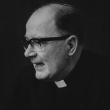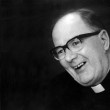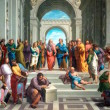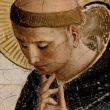The One Cause Behind Everything Else in Reality
by Fr. Robert Spitzer
Filed under The Existence of God

(NOTE: This it the second of a three part series on Bernard Lonergan's philosophical proof for God. Read the first part here. We'll share the third part on Friday.) III. A Reality which is Unrestricted in Intelligibility Must be Absolutely Unique The general argument is as follows: If there were more than one unrestrictedly intelligible reality, there would have to be a difference between the one and the other, and if there were such a difference, then one of the supposedly “unrestricted... Read More
Introducing Bernard Lonergan’s Philosophical Proof for God
by Fr. Robert Spitzer
Filed under The Existence of God

(NOTE: This it the first of a three part series on Bernard Lonergan's philosophical proof for God. We'll share the second and third parts on Wednesday and Friday, respectively.) Introduction Bernard Lonergan was a Canadian Jesuit priest, philosopher, and theologian, regarded by many as one of the most important thinkers of the 20th century. He articulated a philosophical proof for God's existence which may be stated as follows: If all reality is completely intelligible, then God exists. But... Read More
Can We Actually Know Anything About God?
by Joe Heschmeyer
Filed under The Existence of God

Can we actually know anything about God? This is one of the most fundamental questions, and many people, particularly agnostics, will say “no.” The argument tends to go something like this: God, if there is a God, is so far removed from human experience and knowledge that there’s nothing that we can say about Him (or Her or It). Another variation: the only way to verify our knowledge about God would be to die and find out if Heaven and Hell exist; for those of us still alive,... Read More
Understanding Who God Really Is
by Thomas M. Cothran
Filed under The Existence of God

NOTE: This is the third and final part of a three part series on classical theism by theologian Thomas M. Cothran. Be sure to read part one and part two. Any defense against Stephen H. Webb’s critique of classical theism must, then, defend some particular form of classical theism that does have an ontology. Webb declares that “Aquinas is the best representative of what is often called classical theism,”1 and so for the remainder of this article, we will consider whether Webb’s... Read More
A Bad Case Against Classical Theism
by Thomas M. Cothran
Filed under The Existence of God

NOTE: This is the second of a three part series on classical theism by theologian Thomas M. Cothran. Read part one here. Stephen Webb not only misstates what classical theists believe, he misstates why they believe it. Consider, by way of example, Webb’s review of David Bentley Hart’s The Experience of God. Webb claims that Hart infers “the main tenets of classical theism … from the deceptively simple premise of God’s immateriality.” Webb attributes a similar line of... Read More
What is Classical Theism?
by Thomas M. Cothran
Filed under The Existence of God

NOTE: This is the first of a three part series on classical theism by theologian Thomas M. Cothran. Over the last few years, Stephen H. Webb has waged a crusade of sorts against classical theism, especially with respect to its notion of divine transcendence. Webb has authored, by my count, no less than 10 articles on the subject at First Things1, and similar critiques have also been central to his books Mormon Christianity and Jesus Christ, Eternal God. Perhaps surprisingly, Webb... Read More
The Splendor of Thomistic Theism
by Karlo Broussard
Filed under The Existence of God

NOTE: This is the second of a two-part series. Read part 1 here. With the accidentality and priority of being for sensible things now in place, there is only one preliminary metaphysical principle that we need to establish before we can defend Premise 1 (from the first part in this series) and that is the fact that every particular thing—whether sensible or non-sensible (immaterial)—whose being is accidental and prior to its nature must receive being from an agent outside itself, i.e.,... Read More
Why Aquinas’ Argument for God Succeeds and Others Fall Short
by Karlo Broussard
Filed under The Existence of God

NOTE: This is the first of a two-part series. The second part will be shared on Wednesday. Does God exist? Readers here at Strange Notions are well aware that throughout the centuries there have been no few attempts in constructing arguments to support an affirmative answer to this question. This is no less true today (I previously took a shot at making my humble contribution to the discussion here at Strange Notions, which you can read in six parts). Christian philosophers have put forth... Read More
5 Human Desires that Point to God
by Steven Hemler
Filed under Man, The Existence of God

The presence of our enhanced human consciousness not only differentiates humans from animals, it also aids in making the case for the existence of God. That’s because through our human consciousness we desire five transcendental experiences, none of which are necessary for survival. These five transcendental desires are our yearning for: (1) perfect knowledge/truth, (2) perfect love, (3) perfect justice/goodness, (4) perfect beauty, and (5) perfect home/being. Most interestingly, any... Read More
On Those Circular Proofs of God
by Dr. Stacy Trasancos
Filed under Faith, The Existence of God

I remember the first time I read St. Thomas Aquinas’ proofs of God’s existence. Although I was already a believer and although I found them a wonderful adventure in Catholic theology, I thought they were circular. Sure, I thought, if you believe in God and you expect the proofs to prove the existence of God, then the Unmoved Mover, the First Cause, the Argument from Contingency, the Argument from Degree, and the Argument from Design all convincingly follow from postulates to conclusion.... Read More






